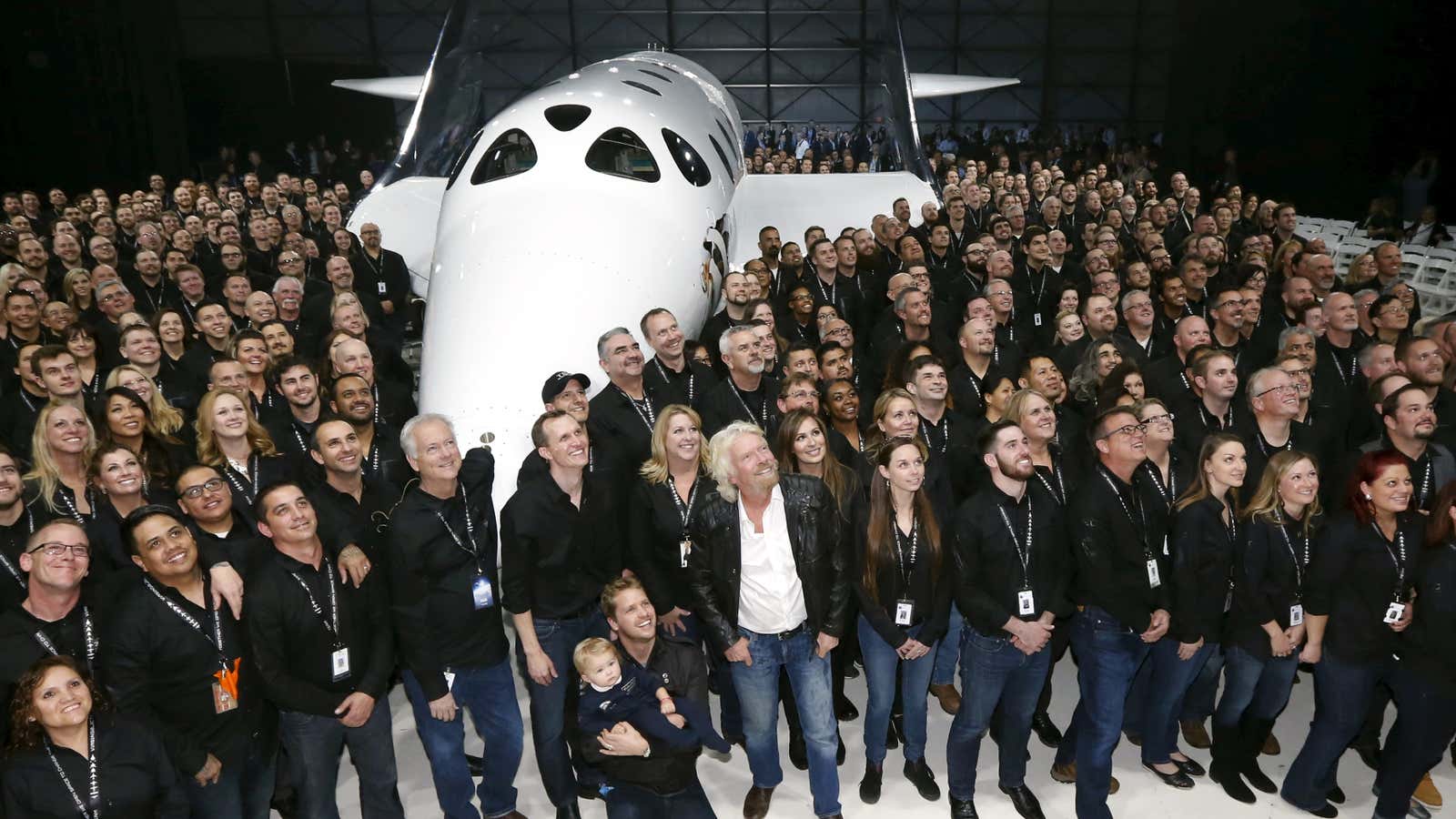The first publicly-traded company whose primary product is launching people into space will come to market this year.
Virgin Galactic, the space tourism firm founded in 2004 by British entrepreneur Richard Branson to launch passengers on 20-minute suborbital flights, is merging with Social Capital Hedosophia (SCH). The Cayman Islands shell company was established in 2017 by venture capitalists led by Chamath Palihapitiya to take highly-valued start-ups public while avoiding the disclosures dreaded by managers of risky ventures.
This kind of acquisition shell, billed by SCH as “IPO 2.0,” is often called a “blank check” company because investors don’t know what they’ll get when they sign on, though the deal must be approved by a plurality of shareholders. Palihapitiya will invest $100 million into Virgin Galactic and become the new firm’s chairman, with SCH owning approximately 49% of the company. SCH partner Adam Bain, the former Twitter executive, will also join the board.
In 2018, Virgin Galactic launched the first humans into space from US soil since 2011, and in February, it sent two pilots and the company’s astronaut instructor, a key demonstration ahead of full commercial operation. Over 15 years, the company has developed a rocket-plane large enough to carry seven people 56 miles above the surface of the Earth, where they can enjoy the zero-g sensation of free-fall and an incredible view for several minutes. Tickets cost $250,000 and the company says it has $80 million in deposits, representing some 600 future passengers.
The new company—spokespeople declined to comment on what the new name might be—will be initially valued at $1.5 billion. But that is based on anticipated 2023 earnings of $600 million, which is when managers expect commercial operations to “achieve scale.” When SCH was founded, Palihapitiya said he was looking to buy “a company that’s between $3 billion and $15 billion in value, probably for the first one, is in the U.S. or Europe, and we want to find something that’s pretty iconic and well-known.”
Virgin Galactic is iconic, but not worth $3 billion even under generous terms. However, SCH was scheduled to return its funds to investors in September if it did not make an acquisition. On the Virgin Galactic side, a Branson-led deal with Saudi Arabia’s sovereign wealth fund fell through in the wake of the murder of journalist Jamal Kashoggi. “When I got to see the business, I was pretty floored,” Palihapitiya told Bloomberg News, saying the deal will give “the average person a chance to own a bit of space.”
The public will have to wait to see the business. The transaction allows Virgin Galactic to avoid disclosing years of financial data required by a typical initial public offering. Some information could be released before SCH’s shareholders vote to approve the deal, or as part of regular public filings once the deal is closed.
CEO George Whitesides told Quartz that Virgin Galactic is now “fully funded” to launch its full commercial service and reach profitability under the company’s business plan. Branson says that he and other investors, mostly Aabar, Abu Dhabi’s sovereign investment vehicle, have spent more than $1 billion on the project so far. The only known revenues are those ticket deposits and a handful of six-figure payments for flying microgravity experiments on test flights.
“The opportunity to tap into future public markets is exciting, the fact that it gives liquidity to both current and future shareholders is exciting,” Whitesides said. “Galactic has often been sort of a pioneer…here’s another example of a fairly prominent space company taking another step forward.
While Virgin has been the first private company to achieve human spaceflight, it was a difficult journey with accidents that cost the life of a Virgin Galactic test pilot in 2014 and three Scaled Composite workers in 2007. And there are competitors waiting in the wings: Jeff Bezos’ space firm Blue Origin is expected to begin flying humans on its New Shepard suborbital rocket in the next year, while Elon Musk’s SpaceX will have the opportunity to fly tourists to the International Space Station. The regulatory framework for this futuristic business remains up in the air, as well.
Still, risks are commonly associated with these kinds of acquisitions. The Wall Street Journal reported this year that companies resulting from “blank check” acquisitions tend to underperform the broader market. But Palihapitiya, a former Facebook investor and founder of the investment fund Social Capital, hopes to establish that this is a viable alternative to traditional IPOs, competing with the direct listings recently used by Slack and Spotify.
You don’t have to be an investment analyst to predict the most important factor in the price of these shares: When Virgin Galactic actually begins regularly flying passengers at Spaceport New Mexico, the site of its future commercial operations, expected sometime in the first half of 2020. Once underway, it will take two to three years to work through the company’s passenger back-log. While executives say little will change about Virgin Galactic’s path forward, there is one major difference: Branson, who has repeatedly and incorrectly predicted the company’s entry into service, will no longer do so.
“Now that we’re a public company I have to be circumspect in what I say,” Branson said today.
